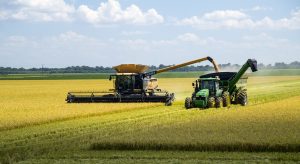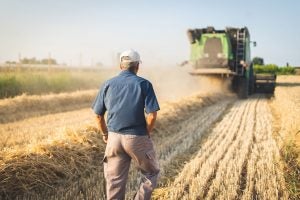It’s easy to think that national security involves far-away countries without much connection to our small, rural towns. But if you tell anyone in those communities that China is purchasing American farmland, you’ll quickly learn that people have rather strong opinions about having communist neighbors. If all politics are local, farmland ownership tops the cake.
Chinese entities are increasingly purchasing U.S. farmland. The situation is far from a crisis: China owns only about 0.9 percent of all foreign-owned farmland in our country. But it has bought up similar property throughout the world — increasing its holdings of foreign land tenfold between 2009 and 2016. China doesn’t control the world’s food supply yet, but this is obviously an intentional and strategic move.
Some state and federal politicians are increasingly concerned about China’s efforts to buy our precious farmland, with some even calling it an issue of national security. That’s hardly surprising. Do we really want our communist competitor owning our most fertile land? How can a country be self-sufficient if it can’t grow the food necessary to feed itself? And if another country controls our food supply, how does that impact our position on the world stage?
These fears have prompted some calls for states to pass legislation curbing foreign ownership of land. For example, under a newly passed state law, Arkansas’ attorney general has ordered Syngenta-owned Northrup King Seed Co. to sell 160 acres of land in the state because Syngenta’s parent company is based in China.

Currently there is no federal prohibition, though foreign nationals must report to the U.S. Department of Agriculture if they buy farmland. As you might imagine, state laws vary.
But some people are pushing for laws that limit how much farmland a foreign entity can own. It’s an interesting proposition that might make things harder for countries like China to purchase land. Yet we should proceed cautiously when implementing limitations on private property rights.
Although laws vary, real property ownership usually comes with a so-called bundle of sticks. Each stick represents the rights that the owner possesses, including possession, control, exclusion, and enjoyment. Arguably, the most important right is disposition — the right to transfer or sell the property to others. Alienability, the capacity to transfer, is a hallmark of real property rights.
I’ve seen firsthand what happens when the government restricts a landowner’s right to sell land. Property rights were a main topic of discussion during my agriculture-themed tour of Ukraine in 2013. The country was still reeling from a communist regime that eliminated private ownership. When Ukraine declared its independence from the Soviet Union in 1997, those rights weren’t immediately restored.
It was something of a mess. Rural communities in Ukraine are structured as villages of houses surrounded by fields of thousands and thousands of hectares each. When property rights were restored in 1997, the government split these large farms between the families who worked them during the communist occupation. But they withheld an important stick: Ukrainians were prohibited from selling their hectares.
The government was concerned that Ukrainians suffering from poor economic conditions would readily sell the farmland. And because Ukraine has some of the most fertile soils in the world, that land was likely to fetch a decent price — a price only foreign nationals could afford. Ironically, when Ukraine finally restored the right of disposition, China scooped up one-tenth of the country’s arable farmland.

Now I’m not suggesting that those opposed to Chinese ownership of U.S. farmland want to eliminate our ability to transfer land. I’m just as concerned about how foreign ownership will impact our agricultural industry in the future. It is a matter of national security, especially when China doesn’t share our values regarding proprietary rights and sustainability.
My point is that we must proceed with caution. We have time to get this right given the — currently small — footprint of Chinese-owned farmland. We don’t want to create a bigger problem than the one we’re solving. But that requires time, consideration, and a willingness to have hard conversations. Given the high stakes of this topic, that’s a commitment we should make.
Amanda Zaluckyj blogs under the name The Farmer’s Daughter USA. Her goal is to promote farmers and tackle the misinformation swirling around the U.S. food industry.



